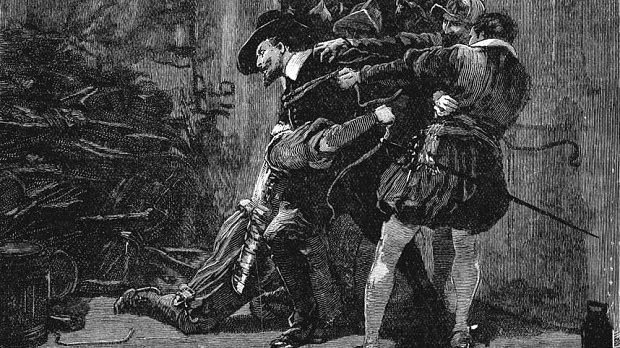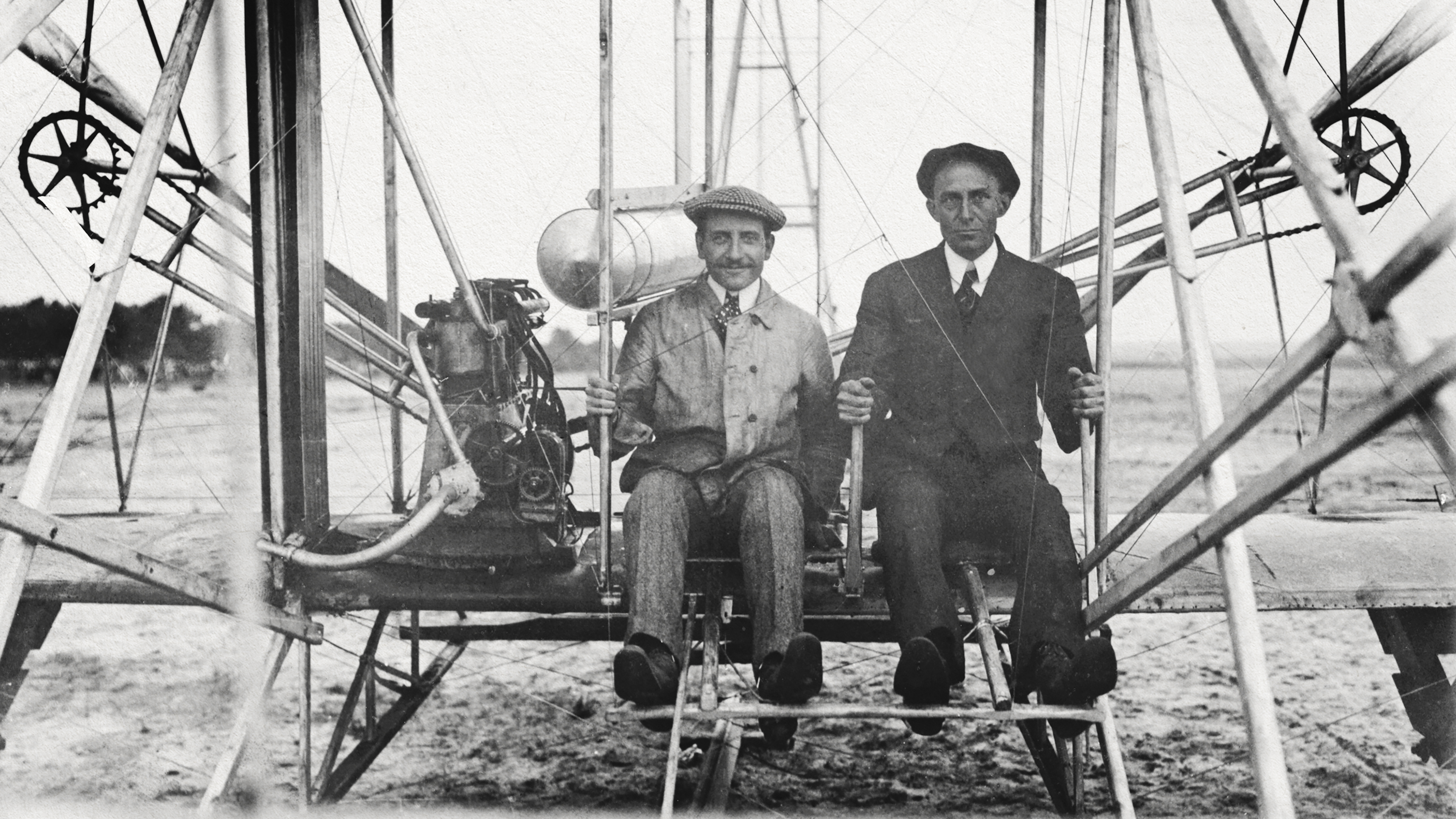MALCOLM GLADWELL: Anyone who came home from the trenches of World War I came home permanently traumatized. The war was mindlessly brutal. There were battles in the First World War where hundreds of thousands of people, there was a battle in the First World War where a million men died. That experience could not be repeated. On the eve of the Second World War, there's a remarkable group of pilots who thought they could reinvent warfare and make war a more humane exercise, a kind of clean war. But that's not what war ever is. It never has that kind of fairytale ending.
My name is Malcolm Gladwell. I am a writer, host of the podcast "Revisionist History," and the author of the new book "The Bomber Mafia."
The story of the Bomber Mafia begins with a group of renegade pilots in central Alabama in the 1930s. They have become convinced that new technology, this new class of bombers, can make it possible to conduct a war where only a handful of people were killed. This is something that no one else in the military thought was even a remotely good idea. The term, "the Bomber Mafia," was not intended to be a compliment. They would always joke that if the people back in Washington knew what they were doing, they would all be fired.
The radical notion at the heart of the Bomber Mafia's dream was that if they were able to drop bombs with precision, no other part of the modern military machine would be necessary. You wouldn't need a Navy. You wouldn't need Marines. You wouldn't need infantry. You wouldn't need tanks. You wouldn't need Jeeps. You wouldn't need anything except a select group of bombers from 20,000 feet. Their approach was based on the idea that there were a handful of targets that the enemy had, which if you destroyed them, the war would be over. They famously did an exercise where they said, what would it take to cripple New York City? And their answer was 14 bombs. Take out the power plants, the aqueducts, the bridges. No water, no power, no access to the mainland. It's over. They felt that idea could be used against any enemy. And the idea that you would have to destroy entire cities in order to subdue your enemy was something they thought ought to be a thing of the past.
Haywood Hansell was the leader of the Bomber Mafia, and he was a Southern romantic. He was the latest in a long line of Southern military men. He would sing show tunes to his men as he returned home from bombing missions over Europe. Haywood Hansell was one of the rising stars in the Air Corps during the Second World War. Hansell managed to convince the military leadership that they should follow his dream. And so he goes to Europe, and they try to conduct a bombing campaign of Germany along Bomber Mafia lines. Let's be as strategic and surgical and sparing as possible in our use of air power. It doesn't work. Then he convinces them to try that same strategy as the air war shifts to Japan in 1944. And it doesn't work. He tries and tries and tries, and he ultimately fails. And he's told in no uncertain terms, "It's over." He's fired. His nemesis, a hard-bitten, unsentimental, ruthless realist named Curtis LeMay is going to replace him. It is at that moment that the dream of the Bomber Mafia crumbles.
Hansell thought that the goal of war was to achieve a military objective with the lowest number of lives lost possible. LeMay felt that that was idealistic nonsense. He thought that war should be fought as brutally and unrelentingly as possible. He was in every way the antithesis of Haywood Hansell and the Bomber Mafia. And that's why the final chapter of the war against Japan is the bloodiest chapter of the Second World War. Most people still don't know about what we did to Japan that summer. The U.S. military built this brand new weapon.
NARRATOR: Known as napalm, it's pourable, stable.
GLADWELL: Developed in a chemistry lab at Harvard University for the express purpose of burning Japanese cities because Japanese cities were tinderboxes, cities made of wood. He took this weapon fresh from the laboratory, and he used it in a way that no other military leader had ever used it. He dropped it by the ton. He drops napalm on every single Japanese city he could find. He's burning people to death by the tens of thousands that summer. There's almost nothing any human being has gone through that is as horrifying as what we inflicted on the people of Japan. Napalm is a gasoline-based jelly that upon impact ignites, and little globs of the jelly splatter in a thousand directions.
NARRATOR: It is jelly-like in substance, clings to and burns in or on the target, sometimes for as long as six minutes.
GLADWELL: The planes that returned from the first firebombing of Tokyo had to be fumigated because the stench of burning human flesh was so overwhelming. We set a torch to every single major city in Japan that summer, with the exception of two cities, Nagasaki and Hiroshima, which we decided to drop an atomic bomb on. It's a scale of destruction almost unmatched in human history.
Robert McNamara, who would later, of course, be the architect of the Vietnam War, he says, "Had we lost the war, we would have been tried as war criminals." And he's probably right. But LeMay goes on to have one of the most storied careers of any American airman in the 20th century. He's the one responsible for all of America's nuclear arsenal throughout the Cold War. He even ends up being the vice presidential candidate on a ticket in 1968.
GENERAL JACK D. RIPPER: There will be only one course of action open.
GLADWELL: He's in Dr. Strangelove, for goodness sake.
RIPPER: Total commitment.
GLADWELL: He becomes a part of the cultural lore of the 20th century. Haywood Hansell fades into obscurity. We reward brutality, but maybe more than that, we reward winners. Haywood Hansell didn't win the prize, not because he wasn't well-intentioned but because he never made it work. LeMay made his strategy work. Sometimes you need someone as cold blooded and unsentimental and ruthless as Curtis LeMay if you want to win a war. You can make the argument, and I think it's the correct argument, that absent Curtis LeMay taking over, the war against Japan might've dragged on for years. On the other hand, this man killed more Japanese civilians than any other person in history.
In retrospect, the great failing of the Bomber Mafia was they were 50 years too soon. They thought they could do in five years what actually took half a century. Today we conduct air wars exactly the way the Bomber Mafia conceived of them in Montgomery, Alabama in the 1930s. I mean, we strike targets with unerring precision. The kind of moral dimension of the Bomber Mafia's crusade has moved from a renegade position to being the conventional, the status quo position of the modern Air Force. If you want to call it progress, we've made progress. I can't say having told the story that I know exactly how things should have gone. You know, if nothing else it says - if you can at all avoid war, you should, because war is impossible. I think we need to keep returning to these moments in history so we can remind ourselves how impossible the choices are.






